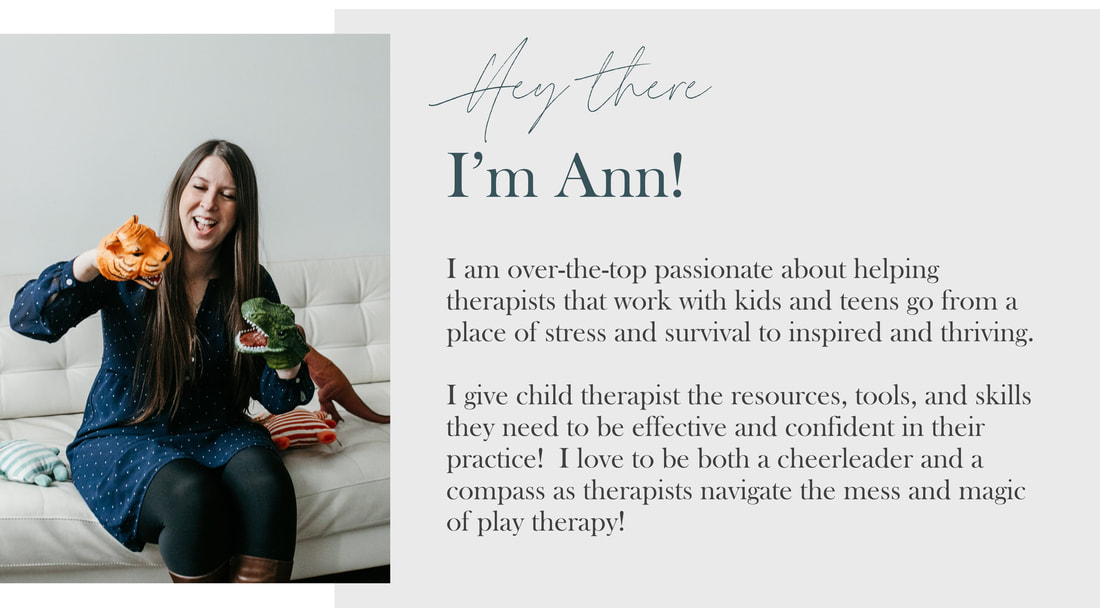|
Child Centered Play Therapy can be one of the theories where imposter syndrome hits hard. As you enter the child’s play you do so with radical acceptance that you will never know 100% of what the child is playing out (even though you may have some excellent ideas).
And it makes sense that one of the most frequent questions I get asked from supervisees and consultees is “Am I even doing anything here?”. If this is a question you have check out more on that HERE!
Understanding play themes is essential to understanding the movement within session and outside of sessions with Child Centered Play Therapy clients. Catch a deeper dive on this topic HERE where I highlight the three main reasons why understanding play themes in Child Centered Play Therapy is important.
But what about outside of the session? Well…. I’m glad you asked! I wanted to highlight the importance of explaining play themes to parents and bridging the gap between Play Therapy sessions and the child’s experiences and reality in life. The first reason that it is important to discuss play themes with parents in Child Centered Play Therapy is it helps maintain the confidentiality of the child when we discuss overall play themes, feelings, and roots vs. the exact play by play of the session. Parents may have some complex feelings if you discuss how the child made specific negative statements to you and put you in “time out”. They may feel a sense of shame or judgment about the child’s play that might cause them to discontinue the therapy process or they might focus that anger or frustration at the child or "correcting" the play. If you are sharing overall themes such as difficulty with conflict, power and control, or not feeling heard this serves as a springboard of curiosity of how the parent perceives their relationship with the child. This is also a great way to explore if the parents need any skills to navigate the parent-child relationship in a way that is open and non-judgmental. It also opens the door to a discussion of how themes might show up in a child’s life in other ways. At the same time, parents don’t have the skills, tools, and training to understand and interpret complex play themes. Some parents take play themes literally or out of context. And in the example above, a child could be playing out the history of parent/child relationship conflict OR they could be playing out something completely different. Lastly, sharing play themes helps the parents gain empathy and understanding for what the child may be going through and the root of the emotional difficulties vs. solely focusing on behavior. If parents can gain a greater understanding of the function of the behavior or the root of the difficulty they can identify different ways to meet their child’s needs at home and in the world as well as more effective ways of parenting. So, here are four concrete ways it helps to share play themes with parents when you are engaging in Child Centered Play Therapy! If this blog is leaving you thinking “But I don’t even know what their play means - how am I supposed to talk about this with parents?” check out this free guide HERE on how to identify a play theme! Looking for more resources and support around play therapy themes? Check out the training Dinosaurs In The Dollhouse: Interpreting Themes in Play Therapy and learn the 7 frameworks and tools to interpret play themes with TONS of case examples! Loading...
1 Comment
Alky
4/24/2023 04:39:32 am
Thank you
Reply
Leave a Reply. |
Hi, there!I'm Ann Meehan, an LPCC, Loading... Archives
July 2024
Categories
All
|
Privacy Policies | Terms of Use | Disclaimer
Contact
[email protected] | Copyright Meehan Mental Health Services 2022
Contact
[email protected] | Copyright Meehan Mental Health Services 2022






